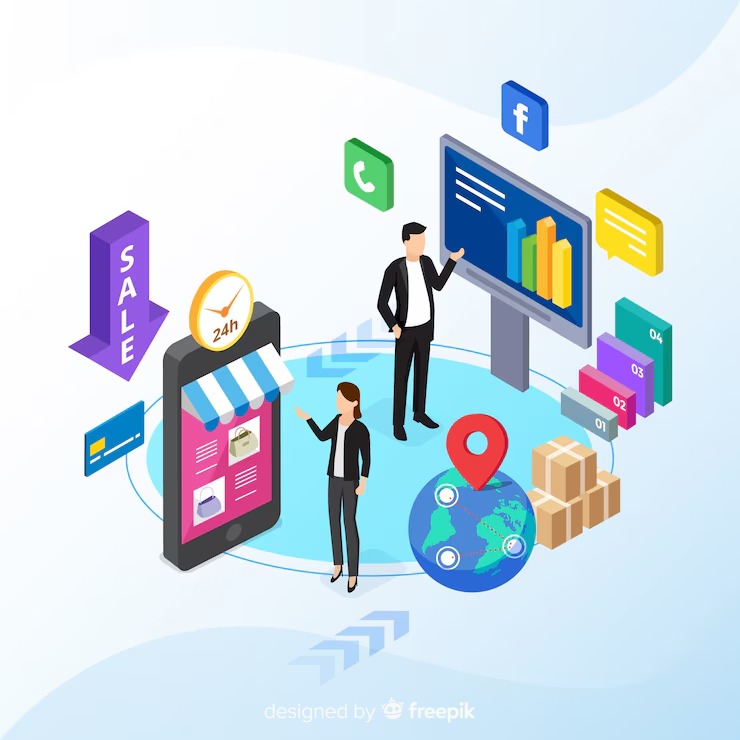Introduction to Ecommerce Development Company
In today’s digital age, businesses are rapidly shifting towards online platforms to reach a wider audience, reduce operational costs, and streamline sales processes. At the heart of this transformation lies the expertise of an Ecommerce Development Company. These companies specialize in building robust, scalable, and user-friendly online stores tailored to each brand’s unique needs. Whether it’s a startup launching its first digital storefront or a large retailer optimizing its ecommerce ecosystem, the role of an ecommerce development partner is indispensable. They serve as the backbone of the entire online business structure, integrating cutting-edge technologies with strategic design to drive conversion, engagement, and growth.
Why Businesses Need an Ecommerce Development Company
The rise of ecommerce is not just a trend—it’s a necessity. Consumers now expect seamless, personalized online experiences, and a professional ecommerce development company ensures businesses meet these expectations. These companies provide end-to-end solutions, including UI/UX design, backend development, third-party integrations, mobile optimization, SEO, and secure payment gateway integration. Moreover, an ecommerce development firm brings deep knowledge of platforms like Shopify, Magento, WooCommerce, BigCommerce, and custom-built solutions, allowing them to create tailored ecommerce websites that align with business goals and target demographics. Partnering with such experts allows businesses to stay competitive, responsive to market demands, and ready for future expansion.
Core Services Offered by an Ecommerce Development Company
A proficient ecommerce development company offers a wide array of services that go beyond just website creation. Custom Ecommerce Website Development is at the forefront, offering businesses a unique and branded online presence. These sites are crafted for performance, speed, security, and seamless user journeys. Ecommerce Platform Migration is another vital service, especially for businesses looking to upgrade from outdated systems to modern solutions without data loss. Mobile Commerce Development ensures that online stores are fully optimized for mobile devices, enhancing accessibility and increasing conversions from smartphone users. API and Third-party Integration is crucial for connecting ecommerce platforms with CRMs, ERPs, logistics systems, and marketing tools. Additionally, Ecommerce App Development, covering both Android and iOS, brings convenience to mobile-first users, enabling faster shopping and personalized experiences.
Ecommerce Website Design and User Experience
Design is a key factor that defines the success of an ecommerce platform. An experienced ecommerce development company employs UI/UX designers who focus on building intuitive, engaging, and conversion-focused interfaces. They use human-centered design principles to create layouts that guide users effortlessly through product discovery, selection, and checkout. Features like advanced search, personalized product recommendations, customer reviews, easy navigation, and optimized page load speeds play a critical role in enhancing user experience. A good design not only attracts users but also encourages repeat visits and loyalty.
Choosing the Right Ecommerce Platform
One of the first decisions businesses face when launching an online store is choosing the right platform. An ecommerce development company guides this decision based on the business model, scalability requirements, budget, and customization needs. Shopify is ideal for startups and small businesses due to its ease of use, built-in features, and hosted solution. Magento (Adobe Commerce) is suited for medium to large enterprises needing complex functionality and custom features. WooCommerce is best for WordPress users seeking a flexible, cost-effective solution. BigCommerce offers enterprise-grade features with user-friendly management tools. A custom ecommerce solution, built from scratch, is often recommended for businesses with unique needs or those requiring high scalability, performance, and control.
Custom Ecommerce Development vs. Pre-built Solutions
While pre-built platforms offer quicker deployment and lower initial costs, they come with limitations in terms of flexibility and scalability. On the other hand, Custom Ecommerce Development allows businesses to have a fully tailored solution, incorporating specific business logic, workflows, and third-party integrations. A professional ecommerce development company will assess your long-term vision and recommend whether a custom or off-the-shelf solution is more viable. Custom solutions are typically more secure, can handle higher traffic loads, and offer better control over the user journey and backend operations. For rapidly growing or niche businesses, custom development offers a competitive edge that standard platforms may not provide.
Importance of Responsive and Mobile-Optimized Ecommerce Sites
With over 70% of online traffic coming from mobile devices, having a mobile-friendly ecommerce site is non-negotiable. Ecommerce development companies prioritize Responsive Web Design, ensuring the website adapts to all screen sizes, from desktops to tablets and smartphones. Mobile-optimized sites not only improve user experience but also contribute to better SEO rankings. Furthermore, features like mobile wallets, touch-optimized interfaces, and app-like experiences through progressive web apps (PWAs) are implemented to cater to on-the-go shoppers. An ecommerce development company ensures that mobile performance is streamlined, secure, and consistent across all platforms.
SEO and Digital Marketing Integration
Building a beautiful ecommerce site is just the beginning. Without visibility, even the best websites struggle to generate sales. Ecommerce development companies integrate SEO Best Practices during the development phase itself—ensuring clean code, fast loading times, mobile responsiveness, and structured data. They also help with setting up SEO-friendly URLs, meta tags, product schema markup, and XML sitemaps. Many companies also offer Digital Marketing Services, including pay-per-click (PPC) advertising, content marketing, social media campaigns, and email automation. These services ensure that your ecommerce store not only functions smoothly but also attracts qualified traffic and converts visitors into loyal customers.
Security and Compliance in Ecommerce Development
Security is a top concern for both ecommerce owners and customers. An ecommerce development company incorporates Secure Socket Layer (SSL) encryption, PCI-DSS compliance, firewalls, anti-fraud tools, and data privacy protocols to protect sensitive information. They also ensure GDPR compliance for businesses operating in or serving the EU. Secure login methods, encrypted payment gateways, and regular security audits help protect against cyber threats and build customer trust. With increasing incidents of data breaches, having a secure ecommerce platform is essential for business sustainability and reputation.
Ecommerce Analytics and Conversion Rate Optimization (CRO)
To grow and refine your ecommerce business, it’s essential to track performance and customer behavior. Ecommerce development companies implement Advanced Analytics Tools like Google Analytics, Hotjar, or Mixpanel to provide actionable insights into user interactions, traffic sources, and sales funnels. Based on this data, they apply Conversion Rate Optimization techniques such as A/B testing, UX refinement, and checkout flow enhancements. This data-driven approach ensures that your ecommerce website evolves with your customers’ needs, continuously improving the user journey and increasing revenue over time.
Post-Launch Support and Maintenance
Launching the website is not the end—it’s the beginning of ongoing development, optimization, and maintenance. Ecommerce development companies offer Post-Launch Support Services, including performance monitoring, bug fixing, software updates, feature enhancements, and security patches. As technology evolves and customer expectations grow, regular maintenance ensures your ecommerce platform stays relevant, secure, and competitive. Many agencies offer dedicated account managers and 24/7 technical support to handle any unforeseen issues quickly and efficiently.
Scalability and Future-Readiness
An experienced ecommerce development company doesn’t just build for the present—they plan for the future. By using modular architecture and scalable infrastructure (e.g., cloud hosting, microservices), they ensure that the ecommerce platform can grow alongside your business. Whether you’re expanding to new regions, launching a mobile app, integrating AI-powered chatbots, or introducing augmented reality product views, your development partner ensures that the foundation is ready for such upgrades. Future-readiness is about flexibility, and that’s a core principle in modern ecommerce development.
Integrating AI, Chatbots, and Emerging Technologies
Today’s ecommerce stores are leveraging Artificial Intelligence (AI) to deliver smarter experiences. From personalized product recommendations and predictive search to AI-powered customer support chatbots, these technologies improve both efficiency and engagement. Ecommerce development companies are increasingly integrating tools like ChatGPT-based support bots, AI-driven inventory management, and machine learning algorithms to automate and personalize customer journeys. Additionally, technologies such as Augmented Reality (AR) allow users to visualize products in real-time, enhancing confidence and reducing returns. These innovations not only set businesses apart but also future-proof their digital presence.
Success Metrics of a Great Ecommerce Development Company
Not all ecommerce development partners are created equal. Businesses should assess prospective companies based on several key success metrics. These include portfolio diversity, industry experience, client testimonials, technology stack expertise, post-launch support, timely delivery, and transparency in pricing. Moreover, a reliable ecommerce development company should work closely with clients as strategic partners, offering proactive solutions, updates, and performance reports. Communication, accountability, and alignment with business goals are essential traits that set top-tier agencies apart from the rest.
How to Select the Right Ecommerce Development Company
Choosing the right development partner is a critical business decision. Start by defining your ecommerce goals, budget, and timeline. Then, assess potential companies based on their technical capabilities, design quality, case studies, and reviews. Schedule consultations to evaluate their approach, understanding of your industry, and responsiveness. Don’t hesitate to ask for demos or prototypes. A well-matched ecommerce development company will not only deliver a high-performing website but also offer strategic insights to drive long-term growth. Make sure their team includes designers, developers, QA testers, project managers, and marketing experts to cover all aspects of ecommerce development.
Conclusion: Fueling Growth Through Expert Ecommerce Development
An ecommerce development company plays a pivotal role in shaping a brand’s digital success. From crafting visually stunning and highly functional websites to ensuring security, scalability, and search visibility, these companies enable businesses to thrive in a competitive online landscape. By offering tailored solutions that align with your goals and audience expectations, they empower your brand to deliver exceptional customer experiences and achieve measurable growth. As ecommerce continues to evolve, partnering with the right development company is not just a smart investment—it’s a strategic necessity for sustainable success in the digital era.


